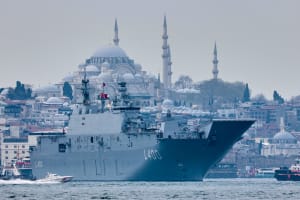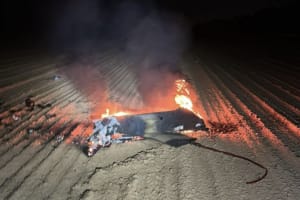Full text: UAE foreign minister's speech at Abraham Accords signing ceremony
The following is a transcript of Sheikh Abdullah bin Zayed Al Nahyan's speech at the Abraham Accord signing ceremony on Sept. 15, 2020 in Washington D.C.
"Two weeks ago, the first Israeli commercial flight landed in Abu Dhabi from Tel Aviv. Along with a large delegation of Israeli officials and media, it carried a bigger message, written in 2-foot-high letters in three languages on the side of the El Al aircraft: Peace. Shalom. Salaam.
"Normalising ties between the UAE and Israel is a historic diplomatic breakthrough and a hopeful sign that progress in the Middle East is possible. Last week came an announcement that Bahrain would also normalise ties with Israel. This is an opportunity for a fresh approach to tackling the region’s challenges. In an area and era all too rife with bad news, it elevates opportunity and optimism over conflict and defeatism.
"Overcoming these forces will be difficult. Non-Arab countries and a mob of non-state actors exist in a warped axis of perpetual resistance. They advocate one brand or another of extremism. They are nostalgic over lost empires or obsess over a new caliphate. They produce and thrive on conflict, disorder and instability. They bash America, Israel and the UAE. They have been the most vicious critics of normalisation.
"The signing of the peace accord this week is the virtuous response. It is a disruptive reminder that Emiratis and Israelis, and all the people of the Middle East, are tired of conflict. The priority now is to continue to modernise our societies and to stabilise the broader region. Better ties between Arab states and with Israel will help, but we must go further and faster on other fronts.
"The first and most urgent priority is to de-escalate tensions and begin a regional dialogue on peace and security. We want normal neighbours. Effective and verifiable nonproliferation and noninterference pacts are the goal. But with expectations so low and the stakes so high, even modest progress on issues like humanitarian assistance and coronavirus response would build confidence.
"US support and participation for such an effort is critical. President Trump has called for new talks next year, and former Vice President Joe Biden has made clear he would pursue a new initiative as well. Gulf states must participate directly in any dialogue and the agenda must be comprehensive.
"A second priority is to expand a community of peaceful coexistence. Perpetual resistance and sectarian extremism have delivered a deadly and decades-long pandemic of chaos and strife. In the Emirates, we are trying to set a different example. We are committed to the true tenets of Islam moderation, inclusion and peace. We hosted the first ever visit of the pope to the Arabian Peninsula last year. We are building an interfaith Abrahamic Family House in Abu Dhabi, with a mosque, church and synagogue in the same complex.
"The third priority is to build a powerful engine of economic and cultural exchange that generates opportunity and understanding across the region. From the Gulf to the Red Sea through the Suez Canal and into the Eastern Mediterranean, the extended Arabian Peninsula is the crossroads of the world. The UAE and Israel must use their advanced economies and infrastructure, large markets, investment funds, educational institutions and human capital to ensure that Jordanians, Egyptians, Palestinians, and others benefit.
"Progress on Palestinian statehood is also central. The UAE-Israel accord stopped annexation. The Palestinian leadership should use this moment to reorganise its approach and prepare to re-engage in productive discussions. As always, they will have the UAE’s full support, now carried with more weight directly to Israel. The pace and scope of normalisation won’t be disconnected from progress on Palestinian statehood and rights.
"Finally, normalisation signifies both the importance of and the shift in America’s role in the Middle East. Normalisation could happen only with the influence of American diplomacy and the reassurance of its security commitments. At the same time, the US gains by divesting more of the burden for regional stability to a stronger team of dependable and willing partners.
"In a difficult year in a difficult region, the peace accord is a bright starting point for the Middle East’s future. The UAE and Israel are off to an energetic beginning with cooperation on the coronavirus and technology, space and energy, investment and food security. Emirati young people are learning Hebrew. UAE universities will begin accepting Israeli students. Regular flights will start next year. These and thousands of other small and large steps will carry the message of peace, shalom and salaam throughout the region."













